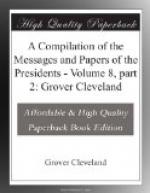JOHN ADAMS.
UNITED STATES, May 31, 1797.
Gentlemen of the Senate:
I nominate General Charles Cotesworth Pinckney, of South Carolina, Francis Dana, chief justice of the State of Massachusetts, and General John Marshall, of Virginia, to be jointly and severally envoys extraordinary and ministers plenipotentiary to the French Republic.
After mature deliberation on the critical situation of our relations with France, which have long engaged my most serious attention, I have determined on these nominations of persons to negotiate with the French Republic to dissipate umbrages, to remove prejudices, to rectify errors, and adjust all differences by a treaty between the two powers.
It is in the present critical and singular circumstances of great importance to engage the confidence of the great portions of the Union in the characters employed and the measures which may be adopted. I have therefore thought it expedient to nominate persons of talents and integrity, long known and intrusted in the three great divisions of the Union, and at the same time, to provide against the cases of death, absence, indisposition, or other impediment, to invest any one or more of them with full powers.
JOHN ADAMS.
UNITED STATES, June 12, 1797.
Gentlemen of the Senate and Gentlemen of the House of Representatives:
I have received information from the commissioner appointed on the part of the United States, pursuant to the third article of our treaty with Spain, that the running and marking of the boundary line between the colonies of East and West Florida and the territory of the United States have been delayed by the officers of His Catholic Majesty, and that they have declared their intention to maintain his jurisdiction, and to suspend the withdrawing his troops from the military posts they occupy within the territory of the United States until the two Governments shall, by negotiation, have settled the meaning of the second article respecting the withdrawing of the troops, garrisons, or settlements of either party in the territory of the other—that is, whether, when the Spanish garrisons withdraw, they are to leave the works standing or to demolish them—and until, by an additional article to the treaty, the real property of the inhabitants shall be secured, and, likewise, until the Spanish officers are sure the Indians will be pacific. The two first questions, if to be determined by negotiation, might be made subjects of discussion for years, and as no limitation of time can be prescribed to the other, a certainty in the opinion of the Spanish officers that the Indians will be pacific, it will be impossible to suffer it to remain an obstacle to the fulfillment of the treaty on the part of Spain.




